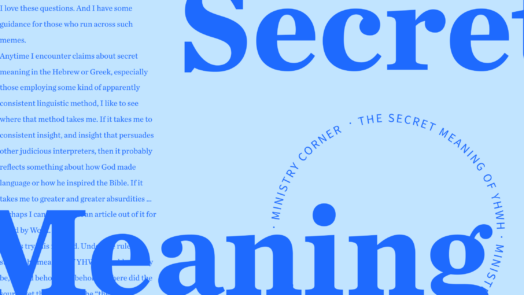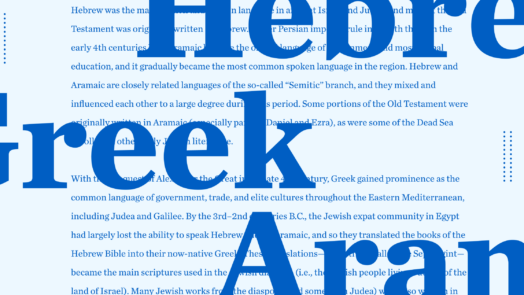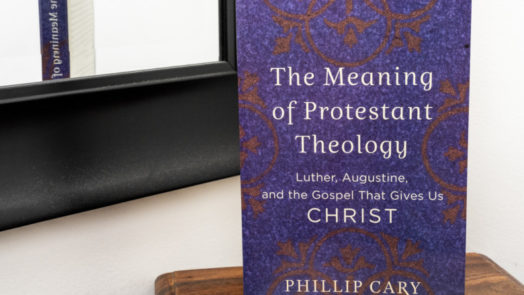Every time March Matchups comes up at Logos, I get selfish—and hopeful. I don’t care what books other people have their eyes on: I know immediately which titles I want and need. Historically, I have reason to hope that those titles will get...
A former coworker of mine, now retired, a very sharp editor and faithful Bible reader, sends me occasional Bible questions. She sent one the other day about the alleged secret meaning of God’s name, YHWH.
The New Testament was originally written in Greek. This claim is not particularly controversial among biblical scholars, though some have argued that parts of the New Testament were originally written in Hebrew or Aramaic. Some popular writers and...
The most important lexicographer of the Greek of the New Testament had this to say about Greek lexicons: It is a mistake to shun the lexicon as a graveyard haunted by columns of semantic ghosts or simply fall back on it as on a codebook identifying...
How many times have you heard this in a sermon? How many times have you preached this in a sermon? Faith in Greek is pistis, which means fidelity or trust. In Hebrew, the word usually translated as faith is emunah, which means steadfastness or...
Spending time in Scripture’s original languages is unquestionably important. But it’s rarely urgent unless you’re teaching or taking a class based on these languages. This means it’s all too easy to put it off to another day, to let things slip. And...
Recently, a member of the church where I preach asked me about Matthew 26:24, 45 and the use of paradidotai (lemma: paradidōmi). His specific question was whether paradidotai could be translated in the middle voice.
The main thesis of this article is to consider whether the inclusion of Psalm 2 within the New Testament automatically draws with it resurrection overtones and significance. Psalm 2 and proleptic speech I will tell of the decree of the Lord: He said...
Seminary will challenge you beyond what you might imagine—spiritually, intellectually, and even physically. For me, going to seminary was the hardest and most wonderful experience of my life. Whether you are already going to seminary or plan to...
Our Savior was a master of enigma, a device by which he made his hearers think. In Matthew 6:22–23 we find a teaching whose initially enigmatic character resolves, under patient study, into delightful clarity. The eye is the lamp of the body. So, if...
Introduction The Lautenschlaeger Award is a prestigious academic prize awarded to ten doctoral or first post-doctoral works in theology and biblical studies. Each winner is awarded $10,000 and the opportunity to propose an international colloquium...
Dependent adverbial clauses are a common feature of Koine Greek, generally categorized based on the kind of content conveyed (e.g., conditional, comparative, spatial, temporal, reason/result, etc.). While many spatial and temporal adverbial clauses...
Years ago, the first substantive biblical studies software I purchased was Gramcord. It was a hugely helpful tool at the time but has long since been surpassed by others. Then, while doing my PhD, I switched to Logos and never looked back...
Psalm Two’s familiar contents have made it a favorite among students, pastors, and scholars alike, as it has echoes of the Davidic covenant, eschatological hopes, and the promise of divine justice. The psalm is quoted or alluded to frequently in the...
Jeffrey Tripp received a doctorate in New Testament and Early Christianity from Loyola University Chicago, and now teaches Math at Rock Valley College. He often incorporates statistical methods into his biblical research, which focuses on the New...
by Luke Nagy We’ve all heard the saying, “this world is not my home; I’m just a passing thro’.” The words are from a hymn penned in 1919, and arranged in 1937. It reflects a popular attitude among Christians in America at the time, and currently. A...
Learning biblical Greek will require some drudgery. But, as they say, “No pain, no reading the Greek New Testament.” I well remember sitting at my desk in grad school, cramming vocabulary into my head like a duck willingly stuffing its body for foie...
I was just having lunch with some pastors, and we were having a friendly disagreement over exegesis. One experienced expositor said, “The Holy Spirit chose precisely this word and not another, so it must have special significance.” I said, “Yes, but...
Wondering how you can prepare for seminary? Perhaps you are like I was . . . excited but nervous. I knew my classes would be rewarding but potentially challenging. I entered seminary as a blank slate. I had never studied Hebrew or Greek, nor did I...
Salmon are anadromous. That’s a $25 word that feels how terms found in encyclopedias are supposed to feel: formal, scientific. It’s in a higher register of English. But if you know a little Greek, you’ll see immediately that all it means is “running...
Christopher Croom | Columbia International University Pilate said to Him, “What is truth?” (John 18:38) Introduction This famous portion of Scripture that has been rendered as a standalone verse is directly related to the crucifixion scene of...
"The contribution, then, constitutes the addition of more pieces of the jigsaw puzzle of a previously published scroll, 8HevXIIgr."
“What does God say about hell?” asks Kris Brossett, kicking off his two-article series on the topic. Brossett proceeds to survey the three historic Christian views of hell—eternal torment, conditional immortality, and universalism—and commendably...
by Phillip Cary The key concept in The Meaning of Protestant Theology is there in the subtitle: The Gospel that Gives Us Christ. That’s the core of Protestant theology and the key to its meaning, as well as the center of the distinctively...
See also Part 1 and Part 2. A Case Study in Matthew 2:1–12 There are forty-seven verbal forms in this pericope; all but 10 verbal forms are perfective aspect. Of those ten forms that are not perfective, one is stative, two are future, and the...
See also Part 1 Verbal Aspect has the Ability to Show Points of Emphasis and De-emphasis In Porter’s analysis of Philippian 2:5-11 the two verbal forms which are not in the perfective aspect are the imperative φρονεῖτε, “Have this mind,” and...
Verbal Aspect is Critical to an Accurate Apprehension of the Text Verbal aspect theory arose to prominence in 1989 and 1990 with the simultaneous work of Stanley Porter and Buist Fanning, who both sought to show how linguistics could further effect...
"Every theology is contextual." - Federico Villanueva
"I am using Josephus's life—his biography, as much as we can know it—as a way of reading Paul's biography."
"Reading the Bible in the original languages causes us to be more thoughtful and careful about the actual wording of the text." -- Robert Plummer




























